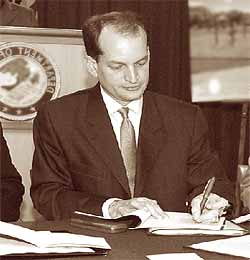Texas
Personal Injury Lawyers
Texas personal injury lawyers are just
as big as Texas itself. Texas is the second largest U. S. state
(California is first) with 23 million residents and a proportionate
amount of personal injury lawyers, so those who have been injured
do not have to settle for lawyers who are not personal injury
specialists as might be the case in lesser populated states.
In choosing a qualified Texas personal
injury lawyer, it is important to pick one who is familiar with
Texas history, culture and politics.
Texas is one of the more politically robust states
and is known for its harsh penalties for criminals. In the past
30 years, 359 executions have been carried out in Texas, the most
in the nation. It is advisable to see the page on
personal injury lawyers first for general information on how
to choose a qualified attorney and then return to this page for
specifics about choosing a personal injury lawyer in Texas.
Over the past 45 years, a historically Democratic Texas has swung
to be Republican controlled in the executive branch and both branches
of the state legislature. As civil law is influenced by political
climate, it is important that the Texas personal injury lawyer
you choose have a knowledgeable grounding in the politics of his
or her district and the state. When choosing a Texas personal
injury lawyer it is advised that you try to choose one in the
district in where the injury occurred so that your attorney is
familiar with the court procedures, laws, mores and nuances of
attitudes for that region.
For instance, even though most of Texas is strongly Republican
(conservative) there are pockets of Democratic (liberal) power
in cities like Austin, El Paso, Dallas, Houston and San Antonio
and in the Rio Grand Valley. Knowing the conservative and liberal
biases of a region will help the Texas personal injury attorney
to litigate the case more effectively. In fact, one of the questions
you may wish to ask the prospective pool of personal injury lawyers
that you are interviewing for the job, can be about their knowledge
of the political climate of their district and how this influences
personal injury cases.
Other questions you may wish to ask when interviewing the lawyers
may be how long they have lived and worked in the district, how
many trials they've litigated locally and the results of those
trials. If your case may involve punitive damages, ask the prospective
lawyer about this since Texas limits damages in most tort actions.
In general, punitive damages may not exceed 2 times the amount
of economic damages, plus non-economic damages up to $750,000.
The prospective attorney needs to be well versed in this area
and if not then this may raise a cautionary red flag in the interview
process. Texas is also a comparative responsibility state and
plaintiffs may only receive damages if their responsibility for
the injury is 50-percent or less. If the attorney is not clear
on this fact, then another red flag is in order.
Also, ask for professional references and find out what opinion
other lawyers have of your prospective Texas lawyer. Though Texas
personal injury lawyers may be hesitant to tell tales about each
other, many times you may be able to read between the lines and
get a consensus when talking with several references about the
prospective attorney.
If you would like to test a prospective Texas personal injury
lawyer about case law, you may wish to ask if they can tell you
about Wilhelm v. Flores, which involves whether or not the seller
of bee hives has the duty to warn the buyer about the inherent
dangers involved. Another case along the same lines is Kroger
Company v. Elwood, which involves whether or not the company had
the duty to warn the employee about the inherent dangers of his
job. If these two personal injury cases are too obscure, then
talk to the prospective lawyer about the Asbestos/Silica Litigation
Reform: SB 15 (2005) bill, which establishes medical criteria
for asbestos claims. This is a case that any qualified Texas personal
injury lawyer, who is up-to-date and has been around a while can
talk about.
In regards on where to find a qualified attorney, referrals from
your friends, neighbors and coworkers is a good place to start.
The Texas State Bar also offers an attorney referral service unlike
most other state bar associations. In addition, the Texas Department
of Motor Vehicles also offers a personal injury lawyer referral
service so these are two places one can start when beginning the
search for a qualified attorney.
Remember that Texas personal injury attorneys are especially
focused on the laws of Texas at the state and local levels. Ask
plenty of questions when researching attorneys and deliberate
on your choice much like a juror would about a case to which they
have listened. With much thought and consideration, you are bound
to make the choice that is right for you. Even if you don't, you
may always change attorneys if the situation changes or if it
just isn't working out.
|


